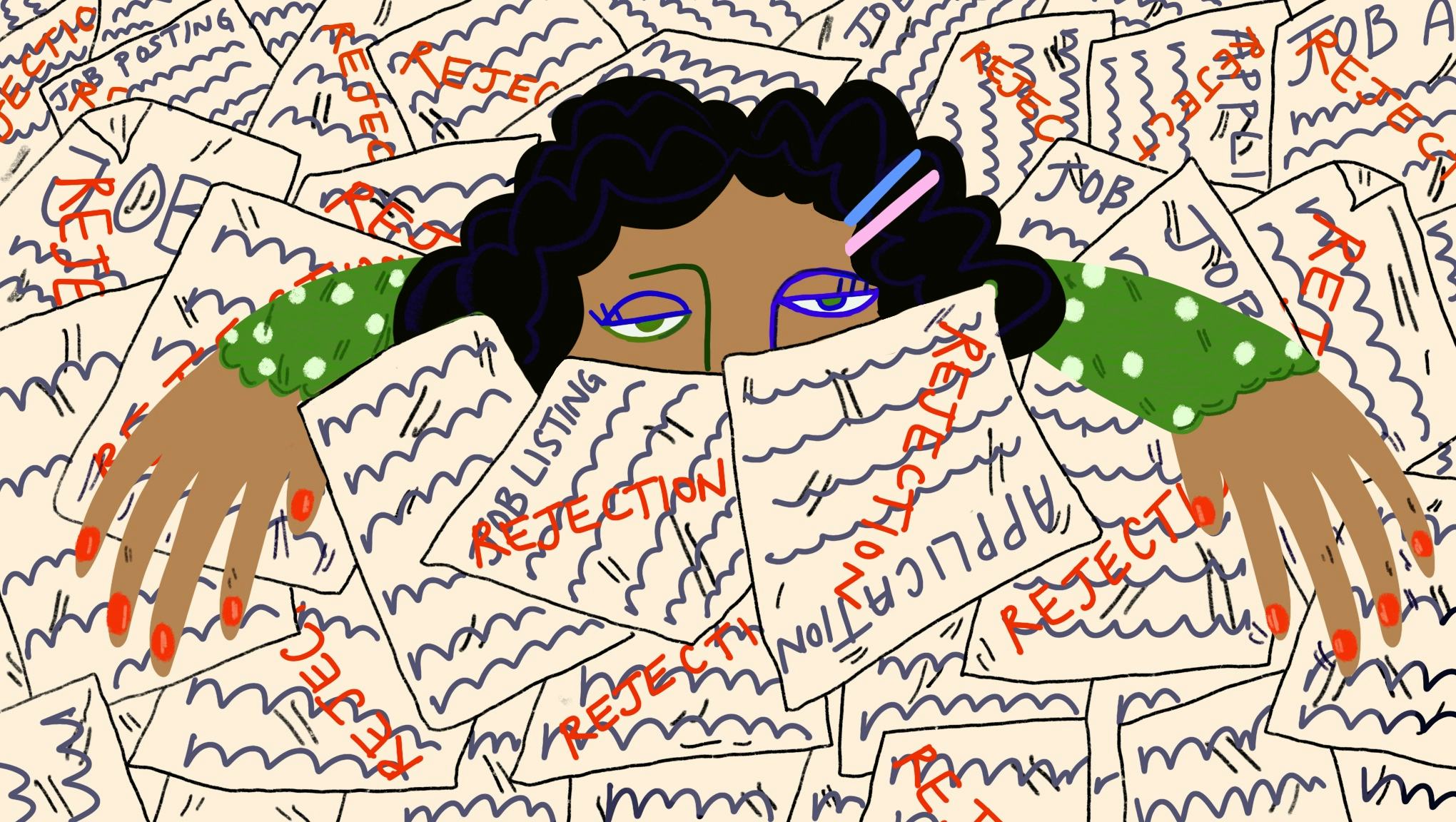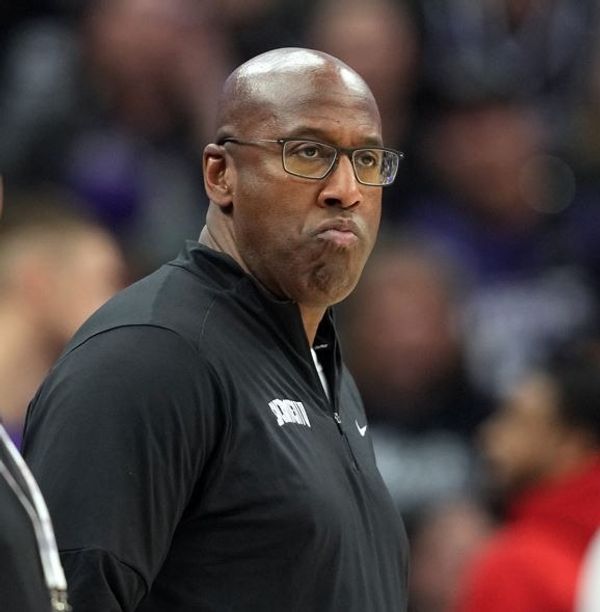
The pandemic did a number on our work lives. For some people, burnout and stressful conditions led to a desire to just jump ship. Others lost their jobs right in the thick of things, and haven’t been able to bounce back yet. As in, it’s been over a year of surfing the waves of unemployment for some young people.
While the overall employment rate in the U.S. seems to be inching up a bit, as of March 2021, over 4 million Americans had been out of work for six months or more, according to the U.S. Bureau of Labor Statistics. What that means is that of the almost 10 million individuals in the U.S. who don’t have work, over 40% of them have been unemployed a long time. And it appears that the bulk of unemployed individuals are under 35.
Keeping it together when you don’t have a job — but really trying to find one — is no easy emotional task. “Looking for work is an emotional process,” says Courtney Cornick, a Chicago-based psychotherapist who works with individuals and employers on diversity issues in the workplace. Aspiration and rejection are baked into the job searching process in a way that can be mentally exhausting. And emotional rollercoaster is already in full speed before someone looking for a job even connects with a potential employer, Cornick explains.
I don’t know when you last updated your resumé, but it requires the kind of herculean fortitude that people make memes about. And once you’ve put time and care into crafting your resumé, a rejection can feel jarring. “It is a personal blow to the ego to be rejected.” Cornick says. So, then, if someone is applying to multiple jobs — which most folks are — it is likely that they will face multiple rejections which can make someone question their worth, skills, and abilities, Cornick explains. It feels super personal (even when technically, it’s professional). The trick, says Cornick, is to hope for the best but anticipate the blow. “Know that rejection is part of the application process and does not measure your worth as an individual,” she says.
But dealing with the seemingly unending sense of rejection that comes with job searching can be overwhelming. “It is deafening to look at job descriptions and apply for job after job,” Amanda Khong, a 29-year-old in Orange County who was furloughed from her job as a marketer for a trendy coffee company at the beginning of the pandemic, tells me. It all becomes a blur, she says.
Khong used her newfound time to get real with herself about business and money. “I now know that I can't rely on a single source of income, because, as we've seen, it's so easy to lose it,” Khong says. So, instead of waiting for one employer to offer her some magic career, she turned her passion into a side hustle. Khong started a blog about coffee and books written by diverse authors, and the confidence she gained by channeling her energy into something meaningful kept her motivated.
“I know that I'm going to work hard to be able to make money to support myself and not have to rely on someone else for my entire livelihood,” Khong says. In other words, while she continued to look for work, she let go of the idea that there was one “right job” out there for her. Diversifying her professional portfolio both motivated her and gave her a sense of self-reliance.
Everyone noticed Khong’s shift in perspective, she tells me. “I started speaking differently,” she says. “I have more drive and I have more goals.” Khong stayed in touch with a previous employer, and apparently he noticed, too. Last week she had lunch with her old boss, and he was so impressed with her enthusiasm and drive that he offered her a new job. Khong said yes, but she’s not giving up her passions. She plans to keep at her small business so that she never finds herself stranded with no income again.

Khong’s is a remarkable situation — and there are plenty of unemployed folks who won’t get job offers based on their side hustles — but we can all learn something from Khong’s approach. Increasing practices that center your wellbeing and continuing to build your confidence during a job search is key, says Cornick. “Make a list of things that are true about your skills and attributes,” Cornick suggests. This serves two purposes: It builds your sense of self worth in real time and it also keeps you practiced in the art of self-promotion, which is an important skill for job seekers.
Side hustles are, without a doubt, a sound coping mechanism for someone waiting for a full-time job in their field.
A lot of the people I spoke with sang the praises of sharpening new professional skills and exploring freelance projects while they looked for jobs. Delaney Smith, a 19-year-old in Seattle has been using freelancing platforms like Upwork during the pandemic as she looks for jobs in media communications. “It keeps me busy, motivated, and allows me to feel productive by making some money,” Smith explains. She said that, at first, the constant rejection she faced in this uncertain market was making her feel useless and pathetic, but that side hustles have helped a lot with that.
For good reason, the hustle economy gets a lot of criticism. No one should have to work 37 jobs to make rent, period. But side hustles are, without a doubt, a sound coping mechanism for someone waiting for a full-time job in their field. They keep you busy, bring in a little money, and keep you connected with other folks who are in the same boat. Feeling supported, Cornick says, is crucial to dealing with the difficulty of extended unemployment. “Reach out to your social supports about your feelings related to the job search,” she says.
Smith agrees. “You are not alone,” she says, to those working on projects in the interim. “We will make it through together.”
For individuals who aren’t looking to connect or have a hard time doing so, Cornick recommends journaling. Whether or not you feel like you “need someone to talk to,” or not, it’s important to recognize and name the feelings you’re having so that they don’t hold you emotionally hostage. In other words: Don’t gaslight yourself. Identity and self-worth are all tied up in career for many of us, and it’s normal to have feelings when you’re riding the unemployment roller coaster, says Cornick.
The reality of looking for work is that it can be a job unto itself. Don’t let looking for work take up all your time, though. It’s hard to take breaks when you feel like you’re standing on the edge of financial ruin, but Cornick says it’s imperative. She suggests limiting the number of jobs you apply to per day and turning off any job-related alerts on your phone. And, Cornick reminds us, it's okay to take a break for a day or two. “Giving your best during your search is key,” Cornick says, and sometimes you need to take some time off to be able to do that. Just like a “real” job.







